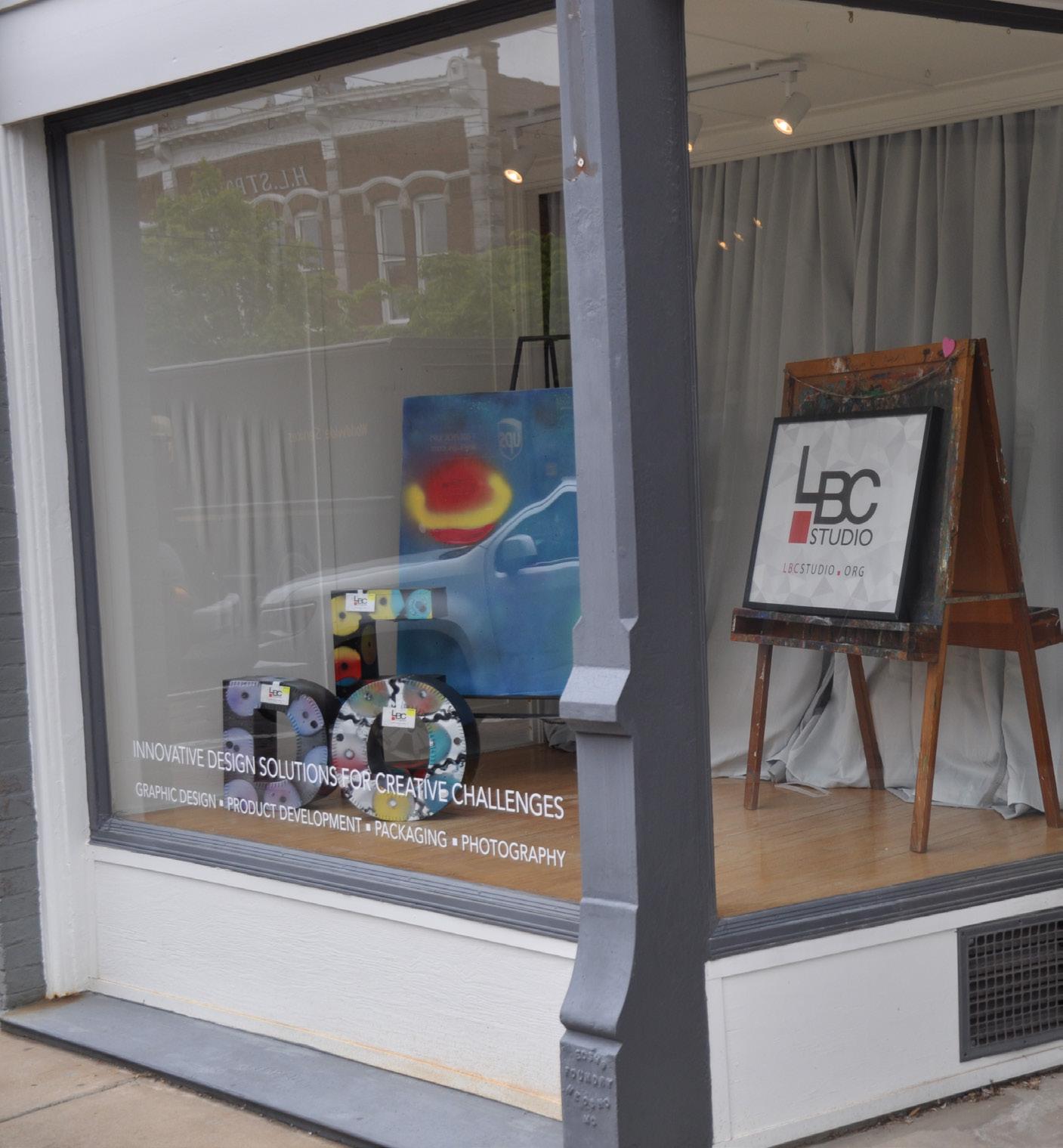
13 minute read
Small Businesses Finding Success with Creative Entrepreneurism
Small Businesses Finding Success with Entrepreneurism C reative
Small business owners who are meeting the needs of customers during a period of social distancing, fear and uncertainty are certainly earning their stripes as entrepreneurs. COVID-19 is the most impactful event of a generation and as business owners struggle to survive, many are finding opportunities to flourish with resilience, innovation, and determination. The Chamber’s popular social media campaign #WeMeanBusiness is recognizing businesses who are surviving with creative entrepreneurism. Here are some of the stories we have discovered.
LBC Studio
A simple storefront at 105 W. Walnut Street provides little hint of the creativity and broad reaching business activities that lie within. Like her commercial space on the bricks of downtown Rogers, Laura Coello, and her design business LBC Studio, are difficult to encapsulate. She designs lots of products and makes business deals that might surprise her neighbors in the historic district. “I was attracted to downtown Rogers for several reasons,” commented Coello. “Most importantly, as a small woman-owned business, it is more affordable than other regions in Northwest Arkansas. And, I just love the look and feel of downtown Rogers.”
Taking Care of Business – Innovative Design
With more than 20 years of experience in design, branding, and product development, Coello’s clients rely on her for new innovative product ideas and packaging design solutions that earn placement on the shelves and e-commerce sites of major retailers. She provides the latest in trends, colors, and patterns for products that are eventually sold in big box
stores. She can conceptualize a product from start to finish or work with a client to identify what is or is not working and make improvements to make it more marketable and more profitable.
With dozens of products and hundreds of moving parts, the LBC Studio workflow can’t be defined with anything less than a massive flow chart. She specializes in textiles and toys but works across many other categories like outdoor, housewares and even food. It takes about six months for a single product to come to market and there are dozens of steps to mass produce the products that line the walls of her studio. Whether she is designing an inflatable raft shaped like a giant swan to accommodate you and six of your closest friends or preparing a photo shoot with a fall bedding line, she makes the process look seamless.
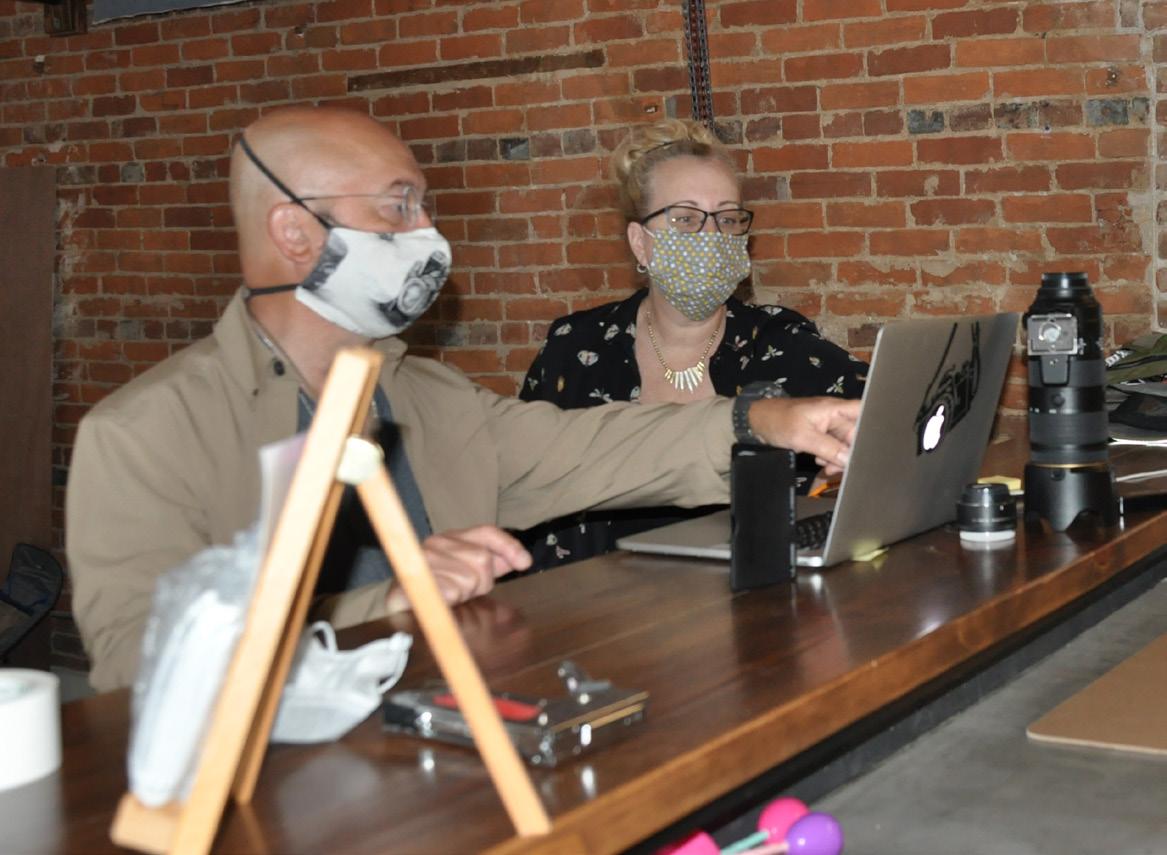
Adapting to Social Distancing
The COVID-19 pandemic has not dramatically impacted her business. “For the most part it has been business as usual since I don’t work with the public,” explained Coello. Her product photoshoots are probably impacted the most. “The coronavirus situation is costing everyone more time and that means more money.” She brings in one photographer to work with fewer models to ensure they have room to accommodate social distancing. But, having worked from home for 10 years, largely meeting with national and international clients online, her process hasn’t changed much.
A few weeks into the Spring coronavirus outbreak her studio looked more like Christmas. An assortment of holiday bedding and whimsical plush robes with stuffed animal hoods were being readied for a photoshoot of product scheduled to hit Sam’s Club in the Fall of 2020. These products are among the dozens each season that Coello designs to attract the attention of Christmas shoppers.
These, as with many consumer products she develops, Coello has been involved every step of the way. She creates the designs, specifies the raw materials, presents samples to the buying teams, designs the packaging, and photographs the product for packaging and dotcom. Coello’s international business operation is an unexpected addition to the brick lined streets and historic buildings of downtown Rogers. “For me, downtown Rogers provides a charming, up and coming area to plant some creative roots,” she explained. “I continue to be optimistic for the future of the retail industry that is thriving in Northwest Arkansas and appreciate the business I have with Walmart and Sam’s Club.”
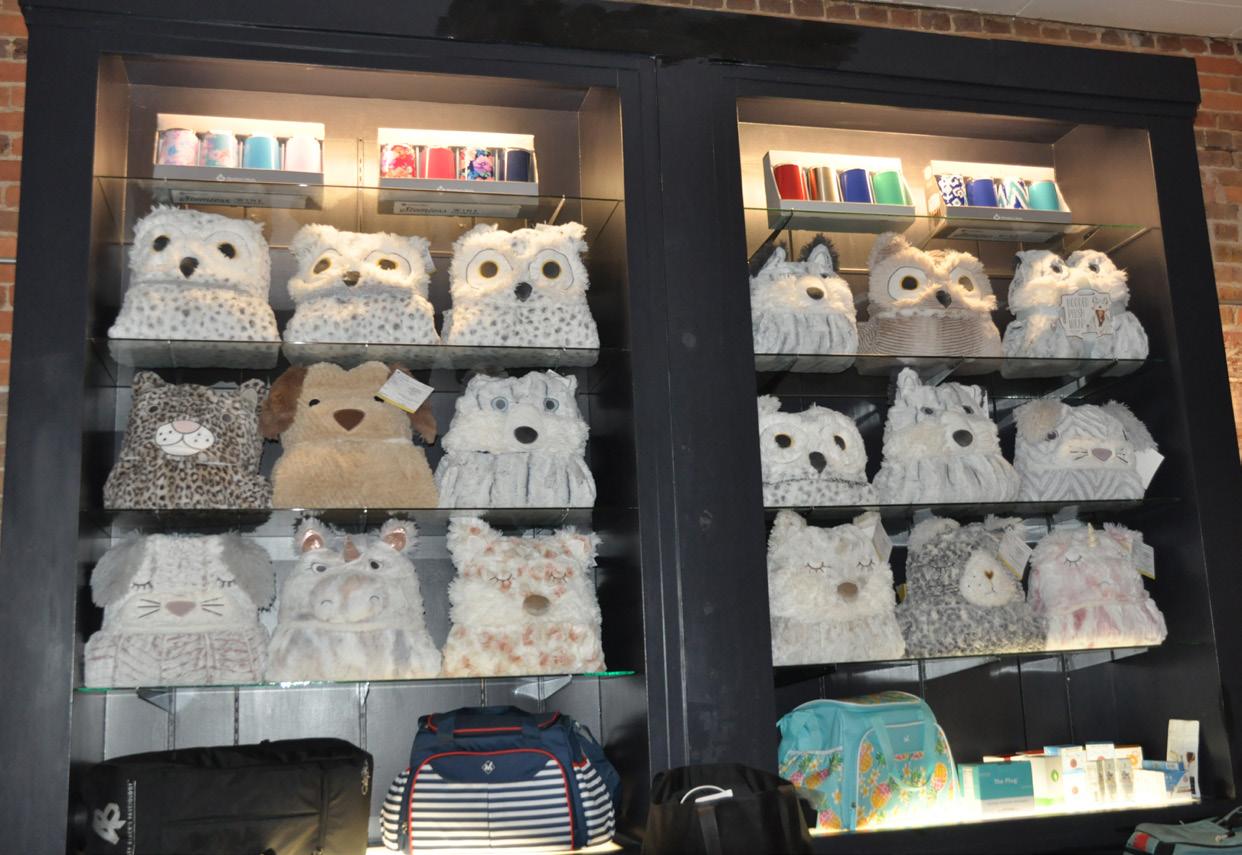
Turn the page to see how
Resource Design & American Estates
have gotten creative in how it does business in the current climate

Resource Design
Resource Design (Rede), an architecture and design firm based in downtown Rogers, has been implementing creative ways to weather the disruptions of COVID-19.
Architect Jessica Hester assumed her role as the new owner and CEO of the almost 30 year-old firm on January 1, 2020, continuing to work with Rede’s established portfolio of clients, and expanding the scope of Rede’s design work by bringing on board artist Dayton Castleman as the new Director of Visual Thinking in early March.
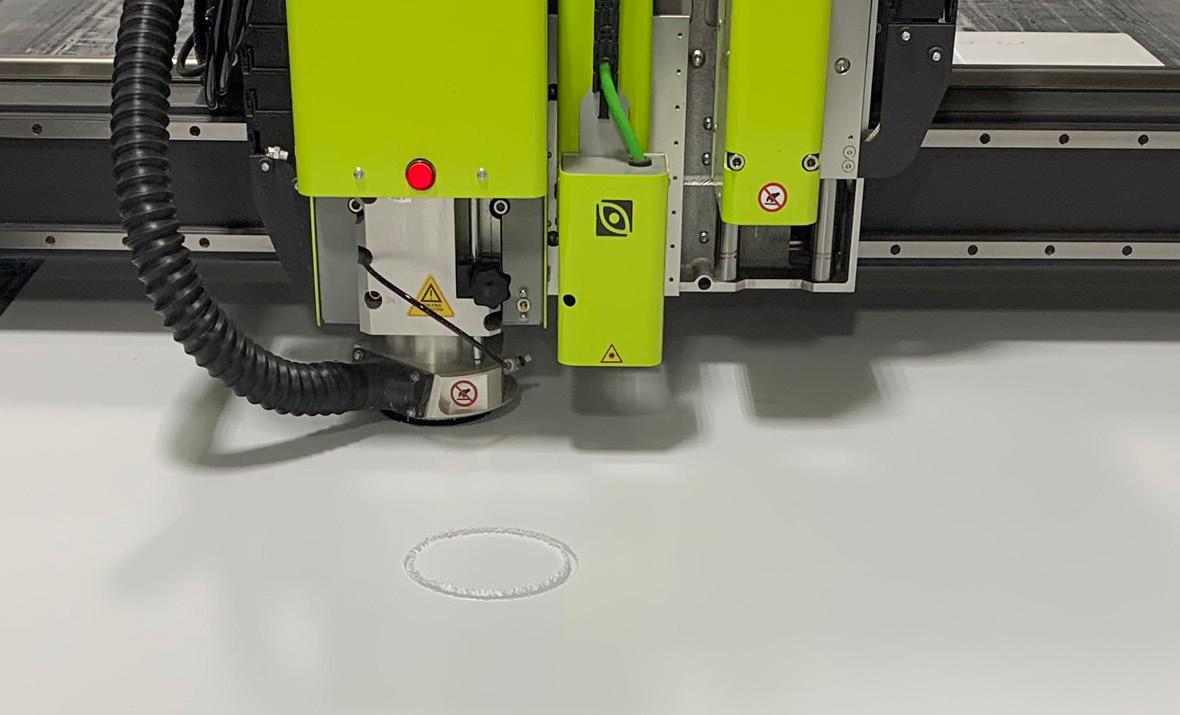
Adapting to Working Remotely
By mid-March, in response to the growing awareness of the impact of COVID19, and the measures required to fight its spread, Rede’s employees agreed to work remotely to protect the company’s employees and clients. They adopted a common online platform for voice, video, and text communication among their team, while maintaining a couple of employees working at their 1st Street office to support some of the functions that require on site work such as printing and receiving deliveries.
While forced to lay off several employees temporarily, CARES Act/PPP assistance allowed the firm to bring back a fully operational staff.
“It was a disorienting week to start a new job,” says Dayton. “Jessica and I settled on my odd job title after weeks of deliberating over what you call a person whose job is to think creatively across all dimensions of the business, and by day six I’m working from my basement.”
“This kind of disruption was a new wrinkle for every single business, and while our work became focused on understanding how our clients were adapting, and on saving our team and our ship, it also allowed us to explore how we could deploy our expertise for the benefit of our community in some unique ways.”
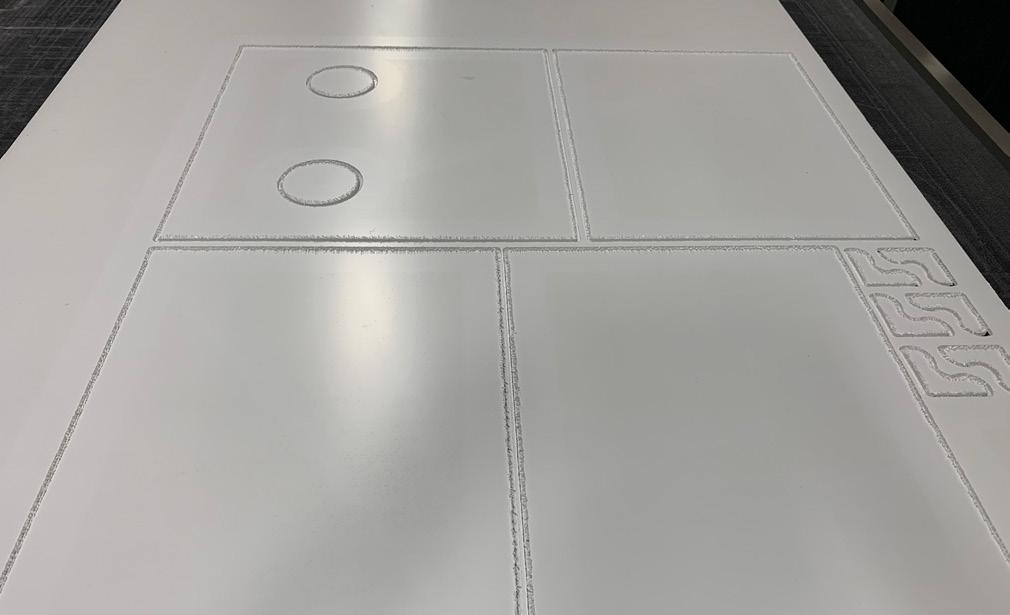
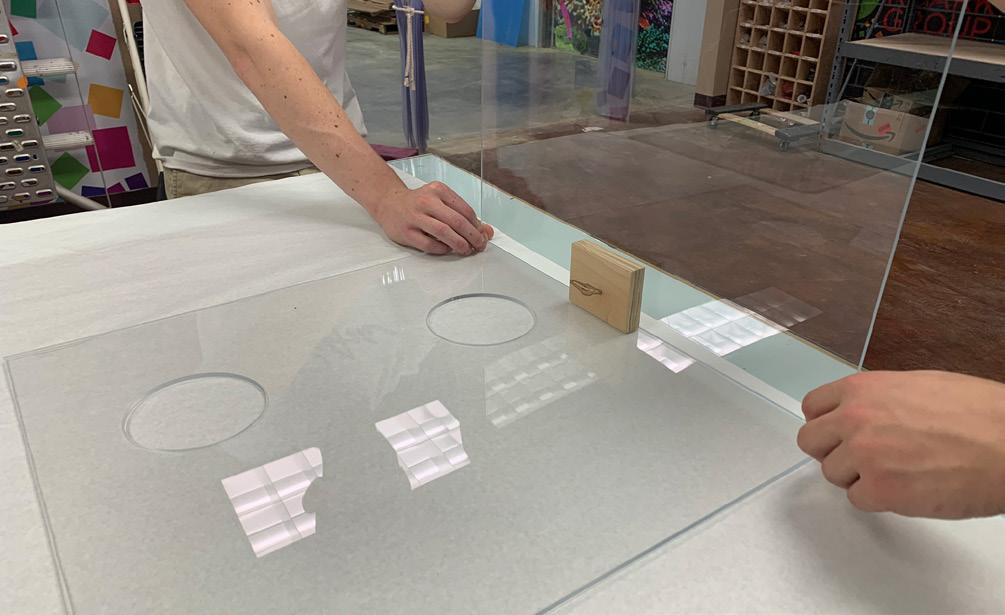
Making Time to Help the Community
In the first days of the shut-down Rede spearheaded a project to facilitate the design and fabrication of clear acrylic “aerosol boxes” intended to provide an added layer of protection for healthcare workers during the process of intubation.
The project was supported by Mercy Hospital and benefitted from technical assistance through the Amazeum. With donated fabrication, assembly, and delivery assistance from The RoArk Group, and fiscal sponsorship by Rogers Experimental House to administer donations from area individuals and businesses (First Presbyterian Church of Bentonville, Bailey and Oliver Law Firm Rogers, BNSF Logistics Springdale), the project was able to distribute 85 boxes to hospitals and healthcare facilities in Arkansas at no cost to the recipient institutions, covering the entire regional Mercy Hospital system, Arkansas Children’s Hospital, Conway Regional, and Ozark Community Hospital, as well as the Rogers Fire Department EMT units.
They have continued their community-focused work with a project to provide protective interaction screens for area businesses looking for customized passive protection for their customers and employees. Using what they have learned working with hospitals, their goal is to provide custom-designed safety equipment to area businesses that give an added layer of protection while interfering as little as possible with customer service.
They are also shaping an initiative to provide pro bono architecture and design work for projects either on hold because of COVID-19, or for businesses working to make space modifications to increase customer and employee safety in the era of this pandemic.


American Estates
Niki and Jesse Weegens, co-owners of American Estates, are makers of original furniture using wood harvested in Arkansas. They have a manufacturing facility in Lowell and a showroom in downtown Rogers. Each piece of furniture is crafted by hand with premium materials and a careful attention to detail. One of the things that sets them apart is they work directly with customers to choose the perfect details for their space, and customize all aspects of a project – the design, dimensions, materials, finish, and all the final details.
Rethinking How to Do Business
Like many other local businesses, the Weegens had to abandon their normal store
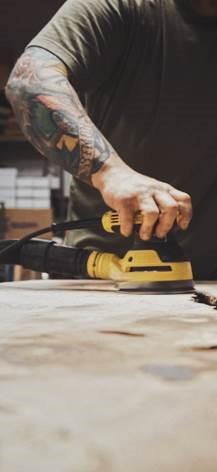
hours and began an increased number of emails and phone calls with their clients. Using proper precautions, they also offer one-on-one appointments with clients in their showroom in the historic building at 103 W. Walnut Street. Additionally, they took this opportunity provided by the COVID-19 pandemic to launch their online store at www.theamericanestates. com/shop. The new website is their first step into e-commerce.
Discovering New Product Opportunities
The reduction of hours in their showroom did not mean a reduction in business. They have had a new opportunity to build furniture that adds function and beauty to the homes of both

new and existing clients. “People have been spending more time at home than ever before, and they are keenly aware of their surroundings,” reflected Niki. “It’s been incredibly meaningful to be able to help provide functional relief and excitement to families who are facing so much change and uncertainty in these days.” Commercial clients are also making needed updates to their spaces while they are finding time to focus on different aspects of operating.
During the COVID-19 pandemic, Nikki and Jesse Weegens have loved seeing the community come together to support local businesses during this crazy time. “It has been refreshing to see the increase in appreciation and mindfulness for small businesses, and we couldn’t be prouder to be part of this amazing community!”

tell your story. Do you have a story of creative entrepreneurism during the COVID-19 pandemic? Let us hear from you so we can help tell your story and help the community learn how to do business with you. Contact Us at www.RogersLowell.com/forms/contact-us or email Justin@RogersLowell.com so we can



COVID-19 Clouds Are Forming on the Horizon for the Governor and Legislators as Regular Session Looms


There have been 46 governors of Arkansas, and most of them entered the office with bold visions and legislative agendas to make the state of Arkansas a better place for its residents. However, many governors of Arkansas have found that those bold visons and agendas were completely altered by time and circumstance. Politics is an institution that is dictated by the tyranny of the moment, and many governors have risen to respond to their “moments”, with time and its passing serving as the ultimate judge of their actions.
On April 23, 2013, Governor Mike Beebe signed the Arkansas Medicaid Expansion Act into law. The new law was known as the “Private Option” and served as a model of bipartisan legislation for the rest of the country to follow. It was passed during the last regular legislative session of Governor Beebe’s long and storied career in state government. Although he had not planned on it, the Private Option would serve as Mike Beebe’s legacy and crowning achievement as Governor.
In January of 2021, Governor Asa Hutchinson will also be facing the last regular legislative session of his time as governor. Hutchinson has been successful in his tenure and has served the people of Arkansas well. Like many governors before him, Asa Hutchinson has also arrived at the crossroads of his own long and storied political career. Time and circumstance have arrived to present COVID-19 for him and the members of the General Assembly with their “moment”.
Budgetary Issues Forming
There is no arguing that the state budget will be impacted by the state’s response to the COVID-19 virus. To what extent that impact will be felt remains to be seen, but most legislative observers will agree that it is going to be substantial. The long streak, in which revenues for the state have exceeded forecasts, has ended abruptly. As a response to the pandemic, the state has already spent down the bulk of its accumulated surplus during a special session held in February. In the next session, State Agencies will likely have to identify cost-saving measures in their budgets, which will affect the services that they provide.
To continue the prosperity that Northwest Arkansas has enjoyed for so long, the business community will be working with our legislators to keep those hard-fought-for tax reforms in place, while championing legislation and sound fiscal policies that will lead to more population growth and job expansion in Northwest Arkansas.
A Special Session?
Liability issues that are influencing business are driving the early discussion among legislators for the governor to issue an Executive Order and call for a special session to pass some form of liability protections from an onslaught of litigation for health care providers and businesses owners. At the time of this writing, chances are 50/50 that the governor will call a special session. If he does, it will be up to him to decide what issues are placed in the call for legislators to consider.
Members Helping Members | Sale Helps Members Secure PPE for Reopening
Business Will Be Impacted
As the legislature meets again this time next year, there is some concern in the business community that the tax reforms passed in the 2019 legislative session could possibly be delayed because of the financial situation the state finds itself. Measures to cut the corporate income tax, to implement the single-sales factor, and extend the “net operating loss carry forward” were measures that served as the core of the recommendations proposed by the Tax Reform Task Force that met in the interim before the last regular session. The Chamber will be monitoring this situation closely and be working next session to keep these much-needed tax reforms in place.
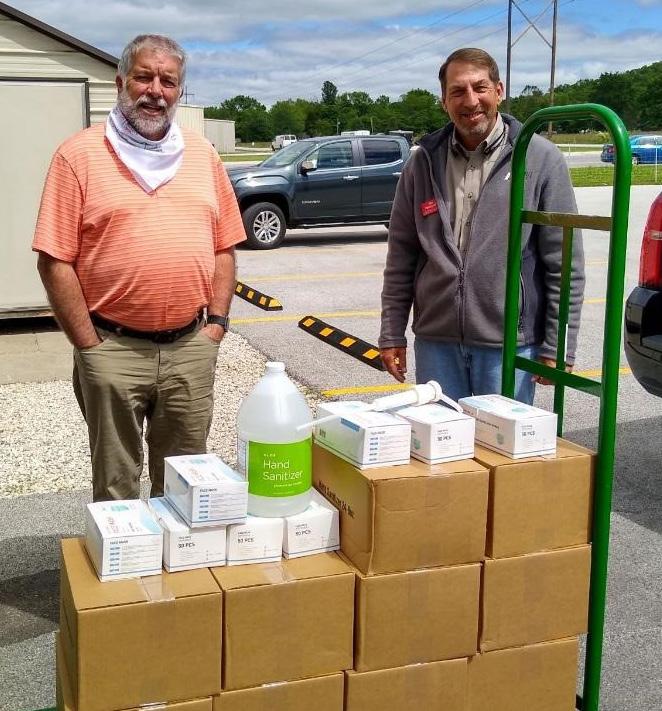
An Unprecedented Time?
The Arkansas economy has not seen a sudden jolt of this magnitude since the Great Depression. At the time Arkansas entered the Great Depression, it was a mostly poor and rural state, and Benton County was one of the poorest counties in one of the poorest states in the country. Now it’s almost a century later, and Arkansas may still be considered a rural state, but it has made great strides economically, and Benton County is now the wealthiest county in Arkansas and serves as the epicenter of one of the fastest growing regional economies in the country.
To continue the prosperity that Northwest Arkansas has enjoyed for so long, the business community will be working with our legislators to keep those hard-fought-for tax reforms in place, while championing legislation and sound fiscal policies that will lead to more population growth and job expansion in Northwest Arkansas.
Pictured is Joe Papczynski (right), long-time Chamber member representing Go Brands, who organized a PPE (Personal Protective Equipment) sale May 16-17 at the Pinnacle Hills Promenade Mall.
A portion of the product was donated to Kent Eikenberry (left) and the Northwest Arkansas Food Bank, receiving more than $2,000 worth of hand sanitizer and masks because of the sale.
The purpose of this sale was to get badly needed PPE to businesses that are reopening in Northwest Arkansas. Hundreds of businesses and individuals showed up to buy supplies and support the Food Bank. Additional product is available by calling Joe for orders or refills at (479) 263-8441.

